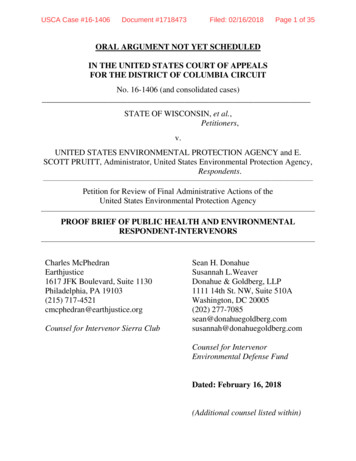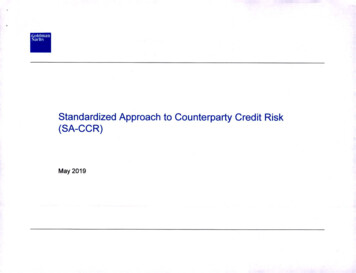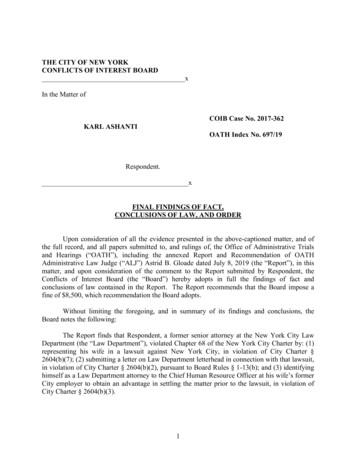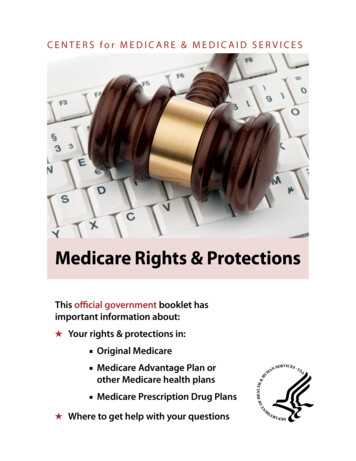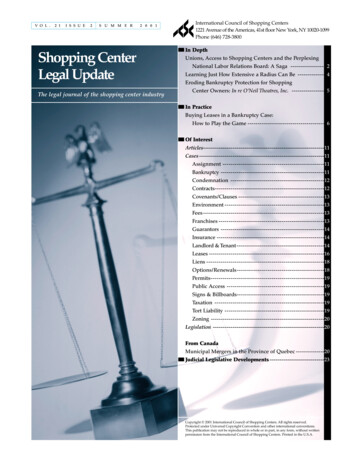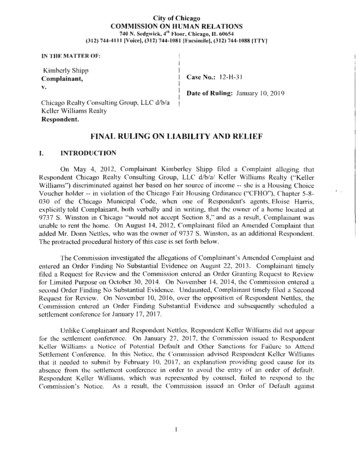
Transcription
City of ChicagoCOMMISSION ON HUMAN RELATIONS740 N. Sedgwick, 4'" Floor, Chicago, IL 60654(312) 744-4111 !Voice], (312) 744-1081 JFacsimile], (312)744-1088 JTTYJIN THE MATTER OF:Kimberly ShippComplainant,Case No.: 12-H-31v.Date of Ruling: January 10, 2019Chicago Realty Consulting Group, LLC d/b/aKeller Williams RealtyRespondent.FINAL RULING ON LIABILITY AND RELIEFI.INTRODUCTIONOn May 4, 2012. Complainant Kimberley Shipp filed a Complaint alleging thatRespondent Chicago Realty Consulting Group, LLC d/b/a/ Keller Williams Realty ("KellerWilliams") discriminated against her based on her source of income -- she is a Housing ChoiceVoucher holder-- in violation of the Chicago Fair Housing Ordinance ("CFHO"), Chapter 5-8 030 of the Chicago Municipal Code, when one of Respondent's agents, Eloise Harris,explicitly told Complainant, both verbally and in writing, that the owner of a home located at9737 S. Winston in Chicago "would not accept Section 8," and as a result, Complainant wasunable to rent the home. On August 14, 2012, Complainant filed an Amended Complaint thatadded Mr. Donn Nettles, who was the owner of 9737 S. Winston, as an additional Respondent.The protracted procedural history of this case is set f(llih below.The Commission investigated the allegations of Complainant's Amended Complaint andentered an Order Finding No Substantial Evidence on August 22, 2013. Complainant timelytiled a Request f( r Review and the Commission entered an Order Granting Request to Reviewfor Limited Purpose on October 30, 2014. On November 14, 2014, the Commission entered asecond Order Finding No Substantial Evidence. Undaunted, Complainant timely filed a SecondRequest for Review. On November 10, 2016, over the opposition of Respondent Nettles, theCommission entered an Order Finding Substantial Evidence and subsequently scheduled asettlement conference f()r January I 7, 2017.Unlike Complainant and Respondent Nettles, Respondent Keller Williams did not appearf(H· the settlement conference. On January 27, 2017, the Commission issued to RespondentKeller Williams a Notice of Potential Default and Other Sanctions f( r Failure to AttendSettlement Conference. In this Notice, the Commission advised Respondent Keller Williamsthat it needed to submit by February I 0, 2017, an explanation providing good cause for itsabsence from the settlement conference in order to avoid the entry of an order of default.Respondent Keller Williams. which was represented by counsel, failed to respond to theCommission's Notice. As a result, the Commission issued an Order of Default against
Respondent Keller Williams on March 9, 2017, and subsequently scheduled this case for an1Administrative Hearing on October 3, 2017.The parties thereatler engaged in written discovery and filed motions for leave to servesubpoenas on a number of individuals and entities. In its Orders dated August 28 and September14, 2017, the Commission granted the parties leave to issue subpoenas to the following personsand entities: Melanie Toney of Housing Choice Partners; Deborah Bcrthgold Smith of ClassicRealty Group; Ezekiel Morris, the managing broker of Respondent Keller Williams; LindseyNettles, Respondent Nettles' niece; Jessica Mallon, the Fair Housing Director of the ChicagoHousing Authority ("CHA"); and to the corporate designee of the CHA regarding the CHA 'sexception rent policy and the agency's communication with the Commission concerning thatpolicy.The Administrative Hearing took place as scheduled on October 3, 2017. Complainantand Respondent Nettles attended and testified. Deborah Bergthold-Smith, Melanic Toney, andJessica Mallon (who was represented by CHA Assistant General Counsel Gina Jang) alsotestified pursuant to their subpoenas. However, neither Respondent Keller Williams nor itscounsel appeared, and Ezekiel Morris (Keller Williams' managing broker) failed to comply withthe subpoena that Respondent Nettles successfully served on him.The Commission thereafter set a briefing schedule for the parties' post-hearing briefs andresponse briefs. Complainant and Respondent Nettles completed their briefing on February 20,2018. Respondent Keller Williams did not file a post-hearing brief.On August 27, 2018, the Hearing Ofliccr issued the Recommended Ruling on Liabilityand Relief, which recommended that the Commission rule in favor of Complainant and againstRespondents on Complainant's source of income discrimination claim.On October 10, 2018, Complainant filed a Request for Voluntary Withdrawal ofComplaint as to Respondent Nettles. On October 16, 2018, the Hearing Officer entered an Orderof Dismissal dismissing Respondent Nettles from this case. This matter is now ripe for decision.For the reasons stated below, the Commission finds in favor of Complainant Shipp and againstRespondent Keller Williams.II.FINDINGS OF FACTI.The United States Department of Housing and Urban Development ("HUD")funds the Housing Choice Voucher program under which "HUD pays rental subsidies so eligiblefamilies can afford decent, safe, and sanitary housing." 24 C. F.R. 982.1 (a)(l ). The HousingChoice Voucher program was fonnerly known as the Section 8 program and the Housing Choice2Vouchers were formerly known as Section 8 vouchers.1The Commission, Complainant, and Respondent Nettles continued to provide Respondent KellerWilliams -- through its counsel -- with notice of all Orders and party-generated submissions that werefiled after the entry of the Order of Default.2The witnesses used tbe phrases "Housing Choice" and '"Section 8" interchangeably at the AdministrativeHearing and tbe phrases should be treated as synonyms for purposes of this decision. Moreover, forsimplicity, the Commission will refer to llousing Choice/Section 8 Vouchers as "Vouchers'" and to thoseindividuals who possess Housing Choice/Section 8 Vouchers as "Voucher holders."2
2.The amount of rental subsidy that is available under the Housing Choice VoucherProgram is based on a local "payment standard" that reflects the cost to lease a unit in the localhousing market. 24 C.F.R. 982.1 (a)(3). Once the payment standard is calculated, the Voucherholder will receive a rental subsidy that is equal to the difference between the amount of thepayment standard and the expected total tenant payment -- which is the t, reater of I0% of theVoucher holder's gross monthly income or 30% of the Voucher holder's adjusted monthlyincome. Nettles Exhibit 4 (CHA Rent Burden Worksheet for Kimberly Shipp).3.The CHA administers the Housing Choice Voucher program in Chicago. SeeNettles Exhibit 6 (Chicago Housing Authority Administrative Plan for the Housing ChoiceVoucher Program- Effective Date: September I, 2011 (excerpt)); Nettles Exhibit 2.4.Complainant Kimberly Shipp is a Housing Choice Voucher holder. Tr. 5. In 2012,Complainant, who has children, held a Voucher that enabled her to rent a four bedroom unit in2012. Tr. 6, 14; Nettles Exhibit 2.5.In late 2011 or early 2012, Complainant enrolled in the CHA Mobility Program.Tr. 6. The Mobility Program is designed help Voucher holders move into "opportunity areas"and "low poverty areas" where they would experience a better quality of life and have a betterlocation to raise their children. Tr. 6.6.In 2011 and 2012, the CHA defined an "opportunity area" as a community area inChicago with a poverty rate of less than 23.49% and an African-American population of 30% orless. Tr. 93-95. At that time, CHA defined a "low poverty area" as a community area inChicago with a poverty rate of less than 16%. Tr. 95; Complainant's Exhibit 3 (CHA Map ofOpportunity and Low Poverty Areas). All other areas of the City were designated as "traditionalareas." Tr. 96-97.7.Ms. Mallon, CHA's corporate designee, testified as f()llows regarding the CHA's"exception rent" policy during the applicable timeframe. Effective September I, 20 II, theCHA's administrative plan for the Housing Choice Voucher Program specified that the CHAwould "administer a set-aside of tenant-based vouchers for use in a demonstration prot, ram toexpand affordable housing choices within housing opportunities areas in the City of Chicago."Nettles Exhibit 6; Tr. 155. Under its demonstration program, "the CHA may approve specialexception payment standards 3 on a unit-by-unit basis up to 300 percent of the HUD publishedFMRs (fair market rents) for the City of Chicago." Nettles Exhibit 6; Tr. !51, 156. To beeligible to participate in this program, a Voucher holder "must select housing in a housingopportunity area," complete mobility counseling, and agree that they arc not eligible to use thehomeownership option. Nettles Exhibit 6; Tr. 151, 156. This policy was still in ef1ect in April2012. Tr. 156.Ms. Mallon further testified that the CIIA -- notwithstanding the policy set forth inits administrative plan (which limited payment of exception rent to Voucher holders seekinghousing in opportunity areas) -- allowed an unspecified number of Voucher holders whoparticipated in the Mobility Program to receive exception rent for housing in lov.· poverty areasprior to July I, 2012. Tr. 120-21,125, 127,145, 149,152,170-72,177-78. Although the CHAdid not provide "blanket approval" for Vouchcr holders to receive exception rent in low povertyR.3The special exception payment standard was also referred to as '"exception rent" by the parties and theCHA. Sec Tr. 151-52, 156.3
areas in 2012, Ms. Mallon testified that it was "possible" that the agency would have approvedexception rent for a unit in a low poverty area if "everything for th[ c] particular unit added up." 4Tr. 127.9.In July 2012, the CHA eliminated the low poverty area designation and areas thathad previously been designated as "low poverty areas" became "traditional areas." Tr. 93, 119;Complainant's Exhibit 5 (e-mail chain between Jessica Mallon from the CHA and Kristen Leefrom the Commission on Human Relations), at 2. 510. In 2012, the CHA contracted with Housing Choice Partners of Jllinois ("HCP") sothat HCP could help Voucher holders find housing units within opportunity and low povertyareas. Tr. 91-92. All Voucher holders who participated in the CHA's Mobility Program wererequired to work with HCP to facilitate their search for housing. Tr. 94.11. Complainant resided at 11735 S. Parnell Avenue in Chicago's Roselandneighborhood during the spring of 2012 when the events pertinent to this case occurred. NettlesExhibit 2; Tr. 55-56. Complainant felt scared to live in Roseland and she wanted to relocate herkids to a better neighborhood so that they could receive a better education. Tr. 14, 55.Complainant has a son who is paralyzed from the waist down and she also wanted to move tofind a better home for him. Tr. 7, 14.12. In April 2012, Complainant was looking to usc her Voucher to move into a lowpoverty area or opportunity area. Tr. 7-8. Complainant focused her housing search on availableunits in the vicinity of the Beverly and Mount Greenwood neighborhoods. Tr. 8-9. The CHAdesignated both Beverly and Mount Greenwood as opportunity areas in 2012. Complainant'sExhibit 3.13. Complainant was working with her assigned Mobility Program counselor/staffperson and a realtor (Deborah Berthgold-Smith from the Classic Realty Group) to assist her withher search for housing. Tr. 7, II, 30, 78.14. At all times pertinent to this case, the house located at 9737 S. Winston (hereinafter,the "Winston house") was owned by Don Nettles. Tr. 192-93. The Winston house is located inthe Washington Heights neighborhood, which the CHA had designated as a low poverty area in2012. Tr. 97, I 06.15. Mr. Nettles engaged a real estate broker named Eloise Harris who was an agent andsponsored licensee of Respondent Keller Williams (a real estate brokerage). Tr. 203-04, 206, 15 16; Keller Williams' Response to Complaint, II; Nettles Exhibit 8 (Exclusive ListingAgreement (CAR) for 9737 South Winston Avenue, Chicago IL 60620), at I. Ms. Harris hadsold the Winston house to Mr. Nettles in 1997 and she was Nettles' broker when he previouslyrented the house. Tr. 195-96. Mr. Nettles has known Ms. Han·is for over a decade and she was apatient of his and had an office in the same building. Tr. 221, 196.4"Everything" refers to whether the rent for the charged unit was in line with the rent f(Jr comparableunits, the location and the amenities of the unit, and the amount that the tenant was able to pay. Tr. 128.5Although the CHA eliminated the low poverty area designation in July 2012, the agency took no actionto correct its erroneous payment of exception rent in previously designated low poverty areas until 2014when the agency informed landlords in those areas that they were no longer entitled to receive exceptionrent. Tr. 120, 126.4
16. On April 2, 2012, Mr. Nettles and his wife signed an exclusive listing agreementwith Respondent Keller Williams to market and lease the Winston house f(Jr 1,700 a month. Tr.205-07, 222-23; Nettles Exhibit 8, at 1. The listing a!, reement specified that Ms. Harris -- "asponsored licensee" of Respondent Keller Williams -- would be the "Sellers' (i.e., the Nettles')exclusive designated agent" fl1r purposes of providing the agreed upon services, which includedcommunicating and negotiating with prospective tenants until the lease of the Winston housewas fully executed. Nettles Exhibit 8, at 1. The listing agreement expressly authorized Ms.Harris to place the Winston house in any multiple listing services that she was participating in.Nettles Exhibit 8, at 3. Finally, Respondent Keller Williams a!,'Teed that it is bound by federal,state, and local fair housing laws and ordinances and that it would comply with them. NettlesExhibit 8, at 4.17. In early April 2012, Ms. Bcrthgold-Smith notified Complainant by e-mail that theWinston house was available to be rented. Tr. 9. Ms. Bcrthgold-Smith reached out to Ms. Harrisby e-mail and scheduled a showing of the Winston house for Complainant on April I 0. Tr. 9-10,22, 29.18. The monthly rent that Mr. Nettles sought for the Winston house ( 1, 700) wasslightly under the average rent for the comparable units and was approved based on the CHA'scomparable rent report. Tr. 149; Complainant's Exhibit 6. However, Complainant's CHA rentburden worksheet -- which is designed to show whether the Voucher holder can afford the unithe/she has selected -- indicates that Complainant would have been able to pay a "maximumallowable gross rent" of only 1,63 I unless she received "exception rent" under the MobilityProgram. Nettles Exhibit 4; Tr. 61-64, I 3 7.19. On April I 0, Complainant called Ms. Harris to cancel the scheduled showing of theWinston house because her son became ill and had to go into the hospital. Tr. 22, 29, 67.Complainant-- who has an unspecified disability-- told Ms. Harris that she would have to callher back to reschedule the showing because she needed to check with her daughter, who was hersource of transportation. Tr. 28-29. Complainant did not mention that she is a Voucher holderduring her April 10 conversation with Ms. Harris. Tr. 70.20. On April 18, Ms. Berthgold-Smith sent an e-mail to Ms. Harris in which sheinquired whether the owner of the Winston house would accept Section 8. Complainant'sExhibit 5, at 2.21. After receiving Ms. Berthgold-Smith's e-mail, Ms. Harris contacted Mr. Nettles,mentioned Complainant's name, and told him that Complainant's broker asked whether hewould accept Section 8 vouchers. Tr. 210- I 1. Although Mr. Nettles expressed his belief that"renting to a Section 8 renter would guarantee that the rent was paid regularly," he also told Ms.Harris that "he didn't want to start the approval process that he understood Section 8 requiredbecause he was going to rent to his niece" and he expected that his niece's credit report would heback soon. Respondent Nettles Position Statement (tiled with his Pre-Hearing Memorandum onAugust 1 I, 2017) ("Nettles Position Statement"), at 2 6 Mr. Nettles knew and told Ms. Harristhat the process to obtain approval to rent to a Voucher holder is longer than with a conventional''Respondent Nettles' Pre-Hearing Memorandum and Position Statement arc part of the Official Record(see Commission Rule 240.51 O(g)) and the Commission has previously cited to such position statementsfi]ed by parties in its past decisions. S'ee, e.g., Lockvvood v. Prr fessional Neurological Services, Ltd.,CCHR No. 06-E-89, at 6, ll (July 8, 2009); Collen v. La /,uce Restaurant, CCHR No. OR-P-34, at 5-6(April 21, 201 0).5
renter because an inspector has to come in and he also told Ms. Harris that he wanted to get arenter in the property "as soon as possible." Tr. 197-9R, 212. Although Mr. Nettles did not tellMs. Harris that he would not consider Section 8 applicants, he provided Ms. Harris with noinstructions regarding how she should respond to the other broker's inquiry. Tr. 212; NettlesPosition Statement, at 2.22. On April 19, Ms. Harris sent to Ms. Bcrthgold-Smith an e-mail in which she stated:"I apologize for the late notice. I spoke to my client and dratled an email last night. He will notaccept Section 8. Thanks to you and your client for your interest." Complainant's Exhibit 5, at1; Tr. 80-81.23. After Ms. Bcrthgold-Smith received Ms. Harris' April 19 e-mail, she calledComplainant and told her what the e-mail stated. Tr. 82. On the morning of April 22, Ms.Berthgold-Smith forwarded Ms. Harris' April 19 e-mail to Complainant. Tr. 82, 16.24. Complainant called Ms. Harris on April 22 to try to sell herself as a tenant. Tr. 12,21. Complainant told Ms. Harris that she was in the Mobility Program and she explained whatthe program involved. Tr. 12, 33. Complainant also told Ms. Harris that she had a copy of hercredit report. Tr. 32, 34. Ms. Harris infi.mncd Complainant that she could make anotherappointment to see the Winston house, there would be a 30 application fee for a back , roundcheck and credit application, and that two other prospective tenants were also considering thehouse. Tr. 12, 22,31-32. Ms. Harris further intl1rmed Complainant that the owner did not takeSection 8 and he would not do so because Section 8 took too long to pay. Tr. 12, 22, 50-51. Ms.Harris, who was not angry and did not use any harsh/inappropriate language during the call,offered Complainant an appointment to view the Winston house on May 5 and Complainantaccepted. Tr. 52-53, 24-26.25. The events of April 22 -- when Complainant read Ms. Harris' April 19 e-mail andspoke with Ms. Harris by phone-- lefl Complainant "feeling disb'Usted" and "hurt." Tr. 14, 57.Complainant was under pressure to find housing during April 2012 because her Voucher (whichwas valid for a sixty-day period subject to extension) was approaching expiration and therejection she experienced on April 22 added to the pressure. Tr. 7, 14. Complainant did not seekany medical treatment for the emotional distress that she experienced. Tr. 56.26. Prior to May 5, Complainant called Ms. Harris and left her a voicemail message tocancel her scheduled May 5 appointment to view the Winston house. Tr. 26. Complainantcancelled her appointment because she had other obligations to tend to on May 5 and she toldMs. Harris that she was going to reschedule in her voicemailmessage. Tr. 26-27.27. Complainant never completed the application process for the Winston house but shewould have done so but for the statements about Section 8 that Ms. Harris made in her April 19e-mail to Ms. Berthgold-Smith and during her August 22 conversation with Complainant. Tr.13.28. Complainant neither met nor had any communications with Mr. Nettles during 2012and she dealt only with Ms. Harris during her effort to lease the Winston house. Tr. 15, 49.29. Instead of rescheduling her appointment to view the Winston house, Complainantfiled her Complaint with the Commission on May 4 and continued to search for suitable housing.Complaint; Tr. 57-58.6
III.CONCLUSIONS OF LAWI.Section 5-8-030 of the Chicago Fair Housing Ordinance ("CFHO") provides mrelevant part as follows:It shall be an unfair housing practice and unlawful f()r any owner, lessee,sublessee, assignee, managing agent, or other person, finn or corporation havingthe right to sell, rent, lease or sublease any housing accommodation, within theCity of Chicago, or any agent of any of these, or any real estate broker licensed assuch:***A. To make any distinction, discrimination or restriction againstany person in the price, tenns, conditions or privileges of any kindrelating to the sale, rental, lease or occupancy of any real estateused for residential purposes in the City of Chicago or in thefurnishing of any facilities or services in connection therewith,predicated upon the race, color, sex, gender identity, age, religion,disability, national origin, ancestry, marital status, parental status,military discharge status or source of income of the prospective oractual buyer or tenant thereof .***C. To refuse to sell, lease or rent, any real estate for residentialpurposes within the City of Chicago because of the race, color, sex,gender identity, age, religion, disability, national origin, ancestry,sexual orientation, marital status, parental status, military dischargestatus or source of income of the proposed buy or renter.In addition, Rule 420.130 of the Commission's Rules provides that:It is a violation of the FHO for a person to refuse to sell, rent or lease a dwellingto a person for the sale, rental or leasing of a dwelling because of that person'smembership in a Protected Class. Such prohibited actions include, but are notlimited to:(a) Failing to accept or consider a person's otlcr because of thatperson's membership in a Protected Class;2."A respondent violates the CFHO when s/he refi.1scs to consider an applicant to rentan apartment due to his/her protected status under the Ordinance," .Jones v. Shahccd, CCHR No.00-H-82, at 7 (March 17, 2004). "The Commission has long since determined that a HousingChoice voucher is a 'source of income' under the CFHO." Shipp v. Wagner and Wagner, CCHRNo. 12-H-19, at 6 (July 16, 2014) (citing to Smith eta/. v. Wilmcllc Real Estatc & Mgmt. Co.,CCHR Nos. 95-H-159 & 98-H-44/63 (April 13, 1999)); Hutchinson v. fjiekaruddin, CCHR No.09-H-21, at 6 (Feb. 17, 201 0) (same). In 2004, the Illinois Appellate Court affinned theCommission's determination on this point. Sec Godinez v. Sullivan-l"ackey, 352 11l.App.3d 87,93 (I st Dist. 2004), aff"'g, Sullivan-Lackey v. Godinez, CCHR No. 99-H-99 (July 18, 2001 ).7
Consequently, it is clear beyond doubt that "a landlord's refusal to consider potential tenantsbecause they have a Section 8 voucher constitutes unlawful discrimination under the CFHO."Diaz v. Wykurz, et al., CCHR No. 07-H-28, at 5 (Dec. 9, 2009) (citing cases); Pigram v. ElectsRealty Champions LLC eta/., CCHR No. 14-H-77, at 6 (April 14, 2016).3.Because the Commission has entered an Order of Default against RespondentKeller Williams and in favor of Complainant, the Commission finds that Respondent KellerWilliams has admitted the allegations in the Amended Complaint and that it has waived anydefenses to the allegations including defenses concerning the Amended Complaint's sufficiency.Commission Rule 235.320. Nonetheless, the Commission itself must decide whether there was aviolation of the CFHO so it must detenninc if it has jurisdiction and whether Complainant hasestablished a prima facie case against Respondent Keller Williams. Commission Rule 235.320;Gardner v. Ojo et al., CCHR No. I 0-H-50, at 13 (Dec. 19, 2012)(citing cases).4.The Commission has jurisdiction over this case given that the alleged violationoccurred within the City of Chicago and that Complainant filed her Complaint within 180 daysofthe actions of which she complains. Commission Rule 210.110.5."Complainant has the burden of proving her claim of discrimination by apreponderance of the evidence using either the direct or indirect methods of proof." Shipp v.Wagner and Wagner, supra, at 6 (emphasis added); Diaz v. Wykurz, supra, at 5 (same). "Underthe direct evidence method in a fair housing case, a complainant may meet her burden of proofthrough credible evidence that the respondent directly stated or otherwise indicated that s/hewould not offer housing to a person based on a protected class, such as having and intending tousc a Section 8 voucher." Shipp v. Wagner and Wagner, supra, at 6. "Direct evidence is thatwhich, if believed, will allow a finding of discrimination with no need to resort to inferences."Shipp v. Wagner and Wagner, supra, at 6 (citing cases).6.Complainant has established a prima facie case of source of income discriminationagainst Respondent Keller Williams. In particular, the evidence shows that Ms. Harris made itclear in her April 19 e-mail to Ms. Bcrthgold-Smith and her August 22 conversation withComplainant that her client would not accept Section 8. Findings of Fact ##22, 24. Statementsto the ctTect that a respondent "would not accept the Section 8 voucher constitute[] directevidence of discrimination in violation of the CFHO." See, e.g., Diaz v. Wykurz, supra, at 6(citing cases); Hall v. Woodgett, CCHR No. 13-H-51, at 4-5 (Oct. 8, 2015) (citing cases); Shippv. Wagner and Wagner, supra, at 7.7.Furthermore, Respondent Keller Williams is vicariously liable for the actions ofMs. Harris' actions under agency principles. As the Commission has recognized, an "agencyrelationship is a consensual, fiduciary one between two legal entities, where the principal has theright to control the conduct of the agent and the agent has the power to affect the legal relationsoflhe principal." Warren, ct a!. v. Lofion & Lofion Management d/b/a McDonalds, eta/., CCHRNos. 07-P-62/63/92, at 19 (July 15, 2009) (internal quotation marks omitted). Moreover, [a]principal may be held liable for the tortious actions of an agent even if the principal does notitself engage in any illegal conduct relative to the injured party so long as the agent commitshis/her torts within the scope of his/her agency." Warren, et al. v. Lofton & Lofion Managementd/b/a McDonalds, el a/., supra, at 20 (citing cases).Respondent admits that Ms. Harris is its agent and sponsored licensee. Furthcrn1orc, theevidence presented at the administrative hearing shows that Ms. Ilarris acted within the scope ofher agency by perfonning her duties as specified under the exclusive listing agreement between8
Respondent and Mr. Nettles when she made the discriminatory statements. Findings of Fact,##15, 16,20-22, 24; see Rankin v. 6954 N Sheridan Inc., eta!., supra, at 13-14. Consequently,the Commission finds that Respondent Keller Williams has violated the CFHO because its agent(Ms. Harris) rejected Complainant as a potential tenant (in account of her status as a HousingChoice Voucher holder. See, e.g., Diaz v. Wykurz, supra, at 5 (citing cases).IV.REMEDIES8.Ordinance:Under 2-120-510(1) of the Chicago Commission on Human Relations EnablingRelief may include but is not limited to an order: to cease the illegal conductcomplained of; to pay actual damages, as reasonably determined by theCommission, for injury or loss suffered by the complainant; . admit thecomplainant to a public accommodation; to extend to the complainant the full andequal enjoyment of the goods, services, facilities, privileges, advantages, oraccommodations of the respondent; to pay to the complainant all or a portion ofthe costs, . incurred in pursuing the complaint before the Commission or at anystage of judicial review; to take such action as may be necessary to make theindividual complainant whole, including, but not limited to, awards of interest onthe complainant's actual damages and backpay from the date of the civil rightsviolation. These. remedies shall he cumulative, and in addition to any finesimposed f(Jr violation of provisions of Chapters 2-160 and 5-8.9.Complainant seeks to recover emotional distress damages in the amount of 8,000for frustration, humiliation, disappointment, anxiety, and lost housing opportunity and award of 10,000 in punitive damages from Respondent Keller Williams. Complainant does not seck torecover any recovery for out-of-pocket expenses. See Complainant's Pre-Hearing Memorandum,at 4-6. It is Complainant's burden to prove by a preponderance of the evidence that she isentitled to the damages claimed. See, e.g., Carter v. CV Snack Shop, CCHR No. 98-PA-3, at 5(Nov. 18, 1998).A.Emotional Distress DamagesI 0. "It is well established that the compensatory damages which may be awarded by theCommission may include damages for the embarrassment, humiliation, and emotional distresscaused by the discrimination." Montelongo v. Azapira, CCJ-!R No. 09-H-23, at 2 (Feb. 15,20 12). "Emotional distress damages are awarded in order to fully compensate a complainant torthe emotional distress, humiliation, shame, embarrassment and mental anguish resulting from arespondent's unlawful conduct." Winter v. Chicago Park District and Lincoln ParkConservatory, CCHR No. 97-PA-55, at 16 (Oct. 18, 2000). The Commission does not require"precise proof' of damages for emotional distress, Nash & Demby v. Sallas & Sallas Realty,CCHR No. 92-H-128, at 20 (May 17, 1995), and "[n]cithcr expert testimony nor medicalevidence is necessary" to establish such damages. Ordon v. Al-Rahman Animal Hospital, CCHRNo. 92-E-139, at 14-15 (July 23, 1993); Hanson v. Association of Volleyball Profi'ssionals,CCJ-!R No. 97-PA-62, at II (Oct. 21, 199X). A complainant's testimony-- standing alone-- maybe suflicient to establish that he or she sufTered compensable emotional distress. Hanson v.Association of Vollevball Professionals, supra, at II; Ordon v. Al-Rahman Animal Hospital,supra, at 14-15. The Commission also acknowledges that "[p]utting a dollar value on emotionaldistress and sutlcring is unavoidably subjective and diflicult." Ordon \'. Al-Rahman AnimalHospital, supra, at 16; Hanson v. Association of Vol/cybal/ Professionals, supra, at II.9
II. Emotional distress damages are gen
Respondent Chicago Realty Consulting Group, LLC d/b/a/ Keller Williams Realty ("Keller Williams") discriminated against her based on her source of income -- she is a Housing Choice Voucher holder-- in violation of the Chicago Fair Housing Ordinance ("CFHO"), Chapter 5-8 030 of the Chicago Municipal Code, when one of Respondent's agents .


